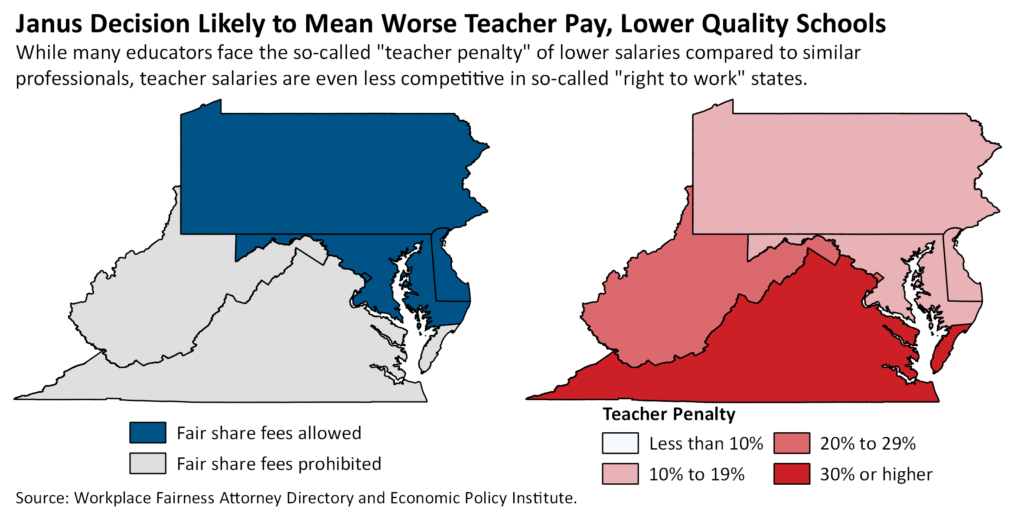Supreme Court Decision Limiting Unions is Bad News for Maryland’s Economy
Maryland’s strong laws protecting workers’ rights to come together and negotiate for better wages and working conditions have helped raise wages for workers across our state, both for union members and non-members. A Supreme Court ruling last week could severely undermine Maryland unions – particularly those representing teachers, firefighters, and other state and local government employees – making it harder for unions to negotiate fair wages and ultimately increasing income inequality.
When we use our shared investments to support family-sustaining public service jobs, we all reap the benefits in the form of higher-quality public services and a stronger labor market. The decision in Janus v. American Federation of State, County, and Municipal Employees, Council 31 further rigs the rules of our economy against working people and undermines the foundation of shared prosperity in Maryland.
At the heart of the case are the fair share fees unions and employers negotiate to cover the costs of collective bargaining. Employees who benefit from a union contract but are not members of the union pay these fees as their share of the cost of the benefits the union is legally obligated to provide, such as representation in a dispute between workers and management. These fees are common in both the public and private sector and – unlike the dues union members pay – can only be used to pay for bargaining costs. In the Janus case, the Court overturned decades of precedent, ruling that fair share fees are illegal in state and local government. This is a major victory for the billionaire-funded lobbyists who have fought against fair share fees for years, but will make it harder for the people who educate our children and keep our communities safe to make their voices heard in the workplace.
While the 259,000 Marylanders who work in state and local government will feel the effects most immediately, all Maryland communities will ultimately share in the damage. Because more than 40 percent of unionized state and local government workers are teachers and other educators, the ruling could harm our public schools. All 24 of Maryland’s local school districts currently face a critical shortage of qualified teachers, according to the State Department of Education. An independent analysis has also found that Maryland is in the bottom 10 states for multiple measures of adequate teacher supply. While these challenges are the result of multiple factors, inadequate compensation is a major contributor. Maryland teachers take home 16 percent less than other professionals with comparable education.
If the recent ruling weakens Maryland teachers’ ability to advocate for their interests in the workplace, their compensation and working conditions are likely to deteriorate further. Fewer young professionals will see teaching as an attractive career and our schools will suffer as a result. This dynamic has already played out next door in West Virginia, where irresponsible tax breaks for powerful special interests and a so-called “right to work” law prohibiting fair share fees have brought public schools to their knees. West Virginia teachers are now paid 25 percent less than other professionals. In the wake of the Janus decision, Maryland could be headed down the same path.
The decision is also likely to mean lower wages and less of a say in the workplace for nonunion workers at both public and private employers. Credible research shows that strong labor unions benefit all working people by establishing norms for what is considered reasonable pay and working conditions. Unions are also an important driver of opportunity for Black workers and As the share of private-sector workers in unions has declined over the last 40 years, the wealthiest 1 percent have captured an ever-larger share of our economy. This dynamic is likely to intensify as the entire country follows the path of “right to work” states where unions have less power to raise wages for members and nonmembers alike.
All working people deserve the same freedom corporate CEOs enjoy to negotiate for a reasonable return on their hard work. By weakening the unions through which thousands of public sector workers in Maryland join together to make their voices heard, the Supreme Court’s decision undermines the foundation of broadly shared prosperity in Maryland.

